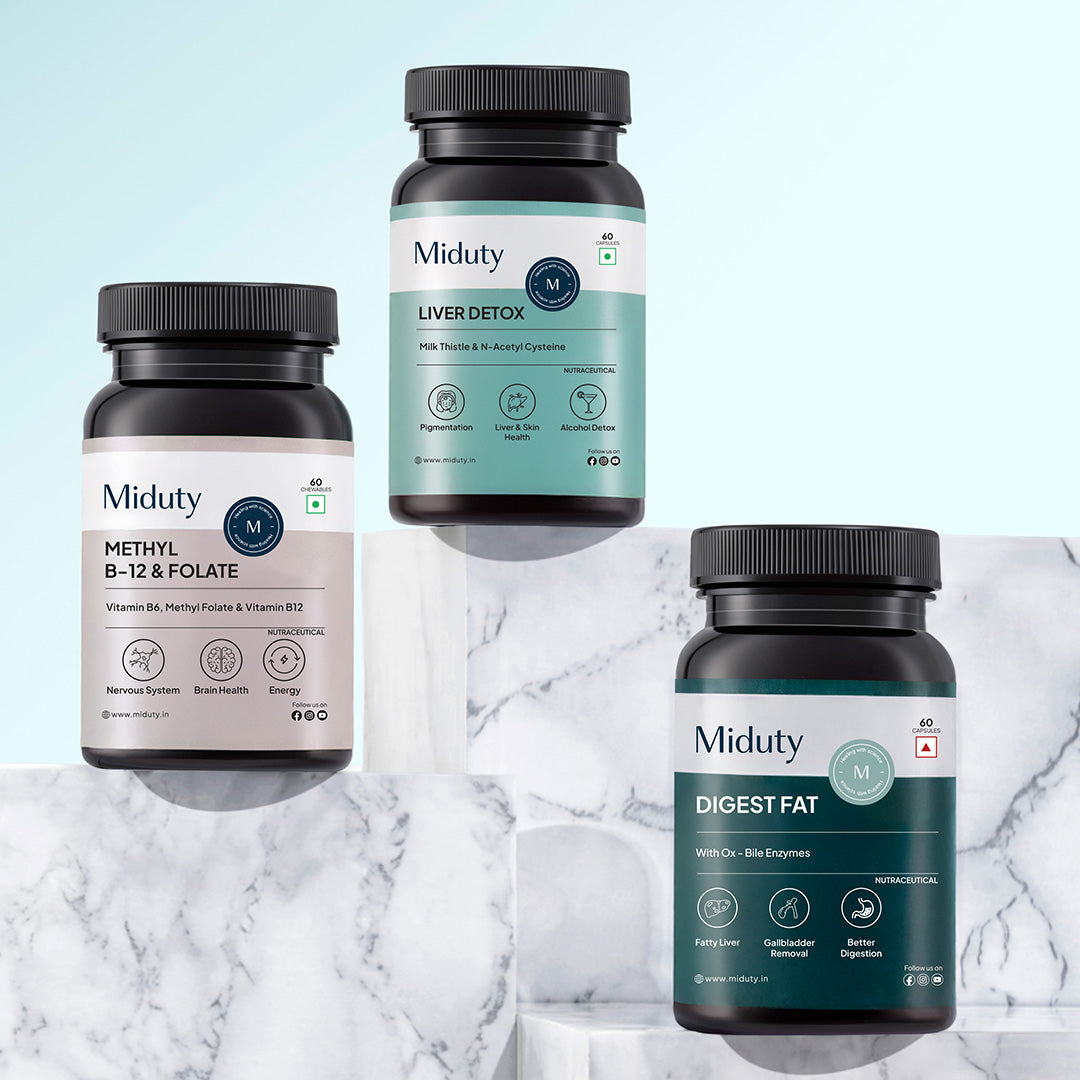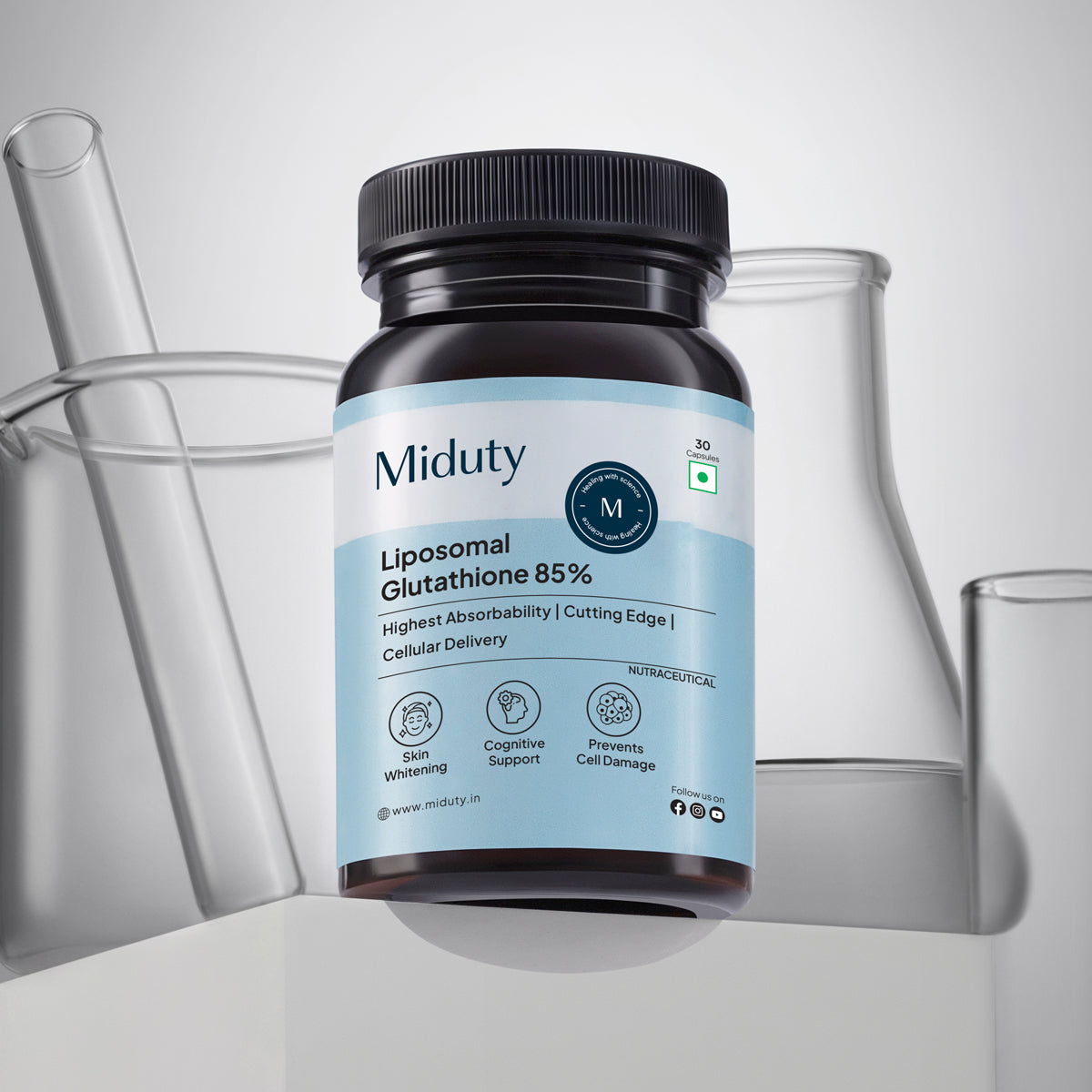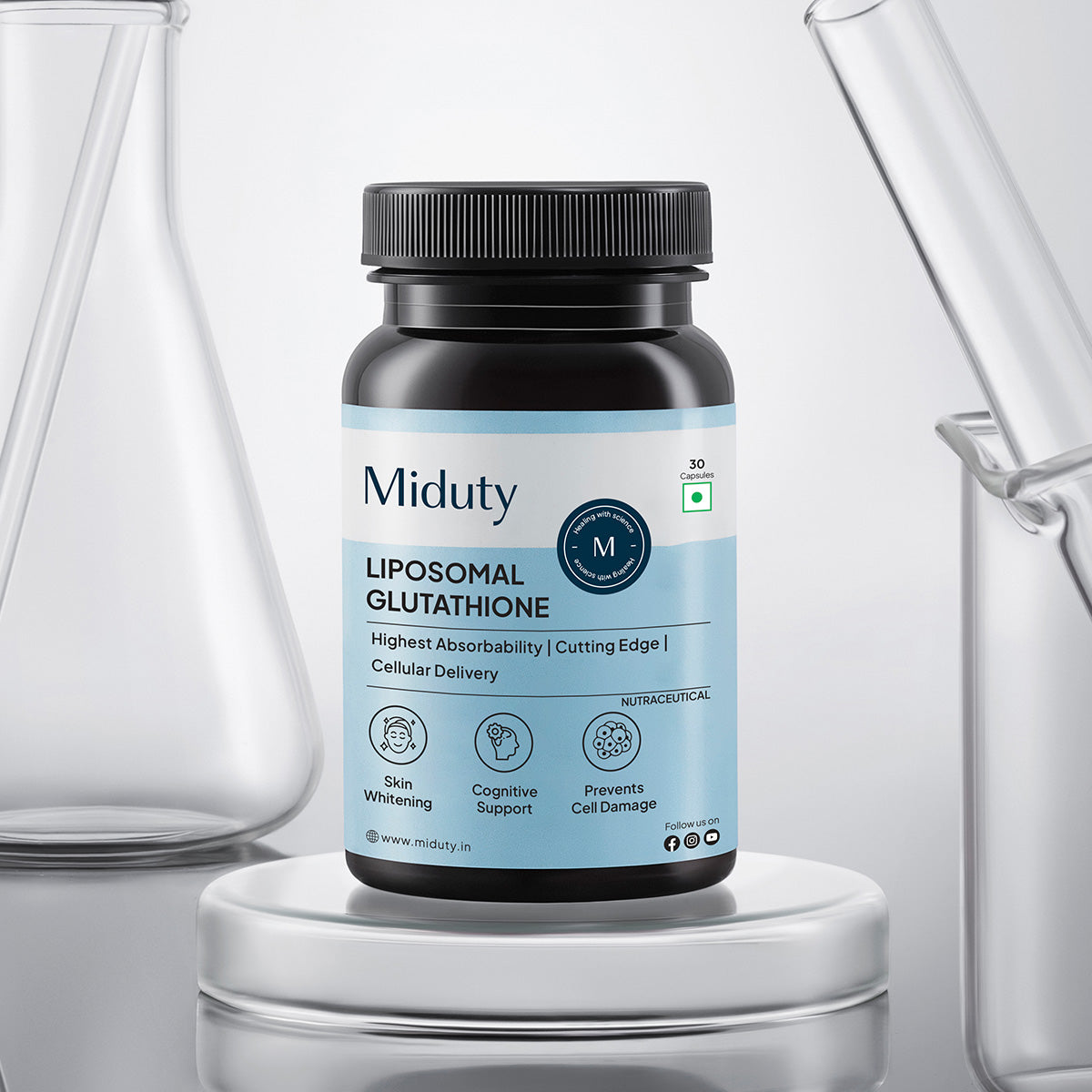
The Role of Choline Deficiency in Fatty Liver Disease (NAFLD)
When it comes to liver health, most people think about avoiding alcohol or eating a low-fat diet. But few are aware of a quiet nutrient warrior that's vital for keeping your liver in top shape: choline. While it doesn't have the fame of Vitamin D or the buzz of Omega-3s, choline plays a pivotal role in maintaining liver function, especially when it comes to preventing or reversing non-alcoholic fatty liver disease (NAFLD). If you've been struggling with liver fat, stubborn belly weight, or sluggish digestion, choline deficiency might be the missing piece of your health puzzle.
Let's dive into what makes this nutrient so essential and why skipping it could be silently sabotaging your liver.
Key Takeaways
1. Choline: The Silent Guardian of Your Liver: This underrated nutrient is crucial for breaking down liver fat and preventing NAFLD, yet most people don't even know they need it
2. Missing Choline? Your Liver Might Be Suffering: Symptoms like belly fat, brain fog, and high liver enzymes could all trace back to a simple nutrient deficiency.
3. Eggs Over Detox? Choline is the Real Liver Cleanse: Forget fads — a couple of eggs a day may protect your liver better than any trendy detox.
4. Plant-Based? You Might Be Missing Out: Vegetarian diets often lack choline-rich foods, making supplementation or strategic meal planning essential.
5. Balance is Key: Get Enough, But Not Too Much. While choline is powerful, mega-doses can backfire. Aim for smart, balanced intake to unlock its full benefits.
What Is Choline?
Choline is an essential nutrient, meaning your body needs it to function but can't produce enough of it on its own. It plays a crucial role in many physiological processes, including brain development, muscle movement, metabolism, and you guessed it, liver health.
Although your liver produces some choline, the rest must come from your diet. Foods like eggs, liver, beef, chicken, fish, and soybeans are rich sources. However, with modern diets veering towards processed foods and plant-based options that often lack adequate choline, deficiency is surprisingly common.
Choline's Role in Liver Health
The liver is your body's detox powerhouse. It processes fats, breaks down toxins, and stores energy. Choline supports the liver in a critical way, it helps transport fats out of the liver. Without enough choline, fats begin to accumulate within liver cells, leading to hepatic steatosis, or fatty liver.
This fat buildup isn't just a cosmetic concern — it triggers inflammation, hampers detoxification, and can progress into serious conditions like non-alcoholic steatohepatitis (NASH), cirrhosis, or even liver failure. In fact, multiple studies have shown that low choline intake correlates with a higher risk of fatty liver, especially among postmenopausal women and people with metabolic syndrome.
Signs of Choline Deficiency
So, how do you know if you're lacking choline? The symptoms aren't always obvious, but they can add up over time. Here are some signs to watch for:
-
Fatty liver (confirmed via ultrasound or blood tests)
- Muscle damage or weakness
- Poor memory or brain fog
- Mood swings or irritability
- Nerve dysfunction
- Elevated liver enzymes (AST, ALT)
It's worth noting that choline deficiency might not always present with immediate symptoms. Often, the first clue comes during routine bloodwork or imaging that detects early-stage fatty liver, a red flag that the liver is struggling with fat metabolism.
Choline Deficiency and Non-Alcoholic Fatty Liver Disease (NAFLD)
NAFLD affects about 25% of the global population. That's one in four people silently developing fat deposits in their liver without drinking a drop of alcohol. This epidemic is closely tied to modern lifestyle factors such as high sugar intake, low physical activity, insulin resistance and, as research now shows, inadequate choline intake.
In clinical studies, people with choline-deficient diets developed liver dysfunction within weeks. One famous study by the National Institutes of Health found that 77% of men and postmenopausal women on a choline-deficient diet developed signs of fatty liver. But when choline was reintroduced, the condition reversed rapidly.
This makes choline not just a preventive nutrient, but a therapeutic one. If you're dealing with NAFLD, adding more choline-rich foods (or a quality supplement) could make a significant difference.
How Much Choline Do You Need?
The Recommended Daily Intake (RDI) for choline varies depending on age, gender, and life stage. According to the Institute of Medicine:
-
Men (19+ years): 550 mg/day
-
Women (19+ years): 425 mg/day
-
Pregnant women: 450–550 mg/day
- Breastfeeding women: 550 mg/day
Best Food Sources of Choline
If you're wondering where to get more choline naturally, here's the good news: some common and easily accessible foods are rich in this essential nutrient. However, the bad news? Most plant-based foods fall short, and if you're vegetarian or vegan, you'll have to be especially intentional.
Let's break down the top sources by category for easy reference:
1. Animal-Based Sources (Top Contributors):
-
Eggs: A single boiled egg gives you about 147 mg of choline. It's one of the most concentrated sources and also incredibly affordable.
-
Beef Liver: If you can stomach it, this is a powerhouse with around 356 mg per 3-ounce serving — practically a full day's worth.
-
Chicken and Turkey: Lean cuts of chicken or turkey offer around 70–100 mg per 3-ounce serving.
-
Fish (like Salmon and Cod): Not only are these excellent for omega-3s, but they also contain roughly 50–60 mg of choline per serving.
- Milk and Dairy: A cup of milk delivers around 38 mg, while cheese and yogurt contribute moderate amounts.
2. Plant-Based Options (Vegetarian-Friendly Picks):
-
Soybeans and Tofu: Cooked soybeans provide about 100–110 mg per ½ cup, making them one of the best plant-based options.
-
Quinoa and Amaranth: These pseudo-grains offer a small boost (about 40–50 mg per cooked cup).
-
Broccoli, Cauliflower, and Brussels Sprouts: Cruciferous vegetables offer around 30–40 mg per ½ cup, plus a host of other health benefits.
-
Nuts and Seeds: Peanuts and sunflower seeds contain small amounts — every little bit helps.
If you're not getting enough from your meals alone (which is common), then combining these sources or considering supplements can help fill the gap. Remember, even if you're eating well, choline isn't abundant in most standard Indian diets unless you're regularly including eggs or meat.
How to Choose The Best Form of Choline for Fatty Liver?
While food should always be your first source of nutrients, sometimes diet alone isn't enough especially if you're pregnant, vegetarian, or diagnosed with fatty liver. This is where supplementation can be a game-changer.
Choline supplements come in several forms:
-
Choline Bitartrate: A basic and inexpensive option, good for general use.
-
Alpha-GPC: Offers high bioavailability and is often used to support cognitive function in addition to liver health.
-
Citicoline (CDP-Choline): Known for its brain benefits but also supportive of liver health.
The dosage you need will depend on your diet and individual health goals. For most adults, a supplement providing 250–500 mg daily can bridge the nutritional gap. However, you should always talk to a healthcare provider before starting, especially if you have underlying liver issues or are taking medications.
Is Too Much Choline Dangerous?
Yes, while choline is vital, more isn't always better. High doses — especially when consumed through supplements — can lead to side effects like:
- A fishy body odor (due to trimethylamine buildup)
-
Low blood pressure
-
Excessive sweating
-
Gastrointestinal distress
- And in extreme cases, liver toxicity
The Tolerable Upper Intake Level (UL) for adults is set at 3,500 mg/day. Most people don't come anywhere close to this, but it's a reminder that supplements should be used mindfully. Balance is key, getting enough, but not overdoing it.
Conclusion
Choline may not be a headline nutrient, but it's a silent hero for your liver. Its role in preventing and reversing fatty liver, supporting metabolism, and enhancing overall health is undeniable. With rising cases of NAFLD and modern diets often lacking this essential nutrient, paying attention to your choline intake is more important than ever. Whether through eggs, soy, or supplements, incorporating choline into your daily routine can be a simple yet powerful step toward better liver function and long-term wellness. Don't overlook this quiet fat-buster, your liver will thank you.
FAQ's on Choline Deficiency and Fatty Liver -
1. Can choline deficiency cause fatty liver?
Controlled clinical feeding studies clearly showed that choline is essential; without it, humans developed fatty liver, liver damage, or muscle injury.
Q2 - How much choline for nafld?
To help prevent and manage NAFLD, the recommended daily choline intake is 550 mg for adult men and 425 mg for adult women.
Q3 - Which organ is damaged by choline deficiency?
Choline deficiency mainly affects the liver, leading to fat buildup and increasing the risk of nonalcoholic fatty liver disease (NAFLD). While it can also cause muscle damage, liver harm is the primary concern and may progress to more serious liver conditions.
Q4 - How do I know if I have a choline deficiency?
Your body signals when something's missing—fatigue, brain fog, or muscle weakness may point to choline deficiency. Essential for brain function, metabolism, and liver health, choline is often lacking in the average diet.
Q5 - Which choline is best for fatty liver?
For fatty liver, phosphatidylcholine is considered the most effective form of choline, as it supports lipid transport and lipoprotein assembly in the liver.
References














